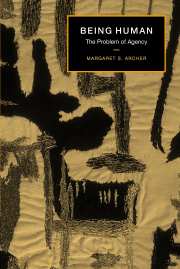Book contents
- Frontmatter
- Contents
- List of figures
- Acknowledgements
- Introduction
- Part I The impoverishment of humanity
- Part II The emergence of self-consciousness
- 4 The primacy of practice
- 5 The practical order as pivotal
- Part III The emergence of personal identity
- Part IV The emergence of social identity
- Conclusion: the re-emergence of humanity
- Index
5 - The practical order as pivotal
Published online by Cambridge University Press: 22 September 2009
- Frontmatter
- Contents
- List of figures
- Acknowledgements
- Introduction
- Part I The impoverishment of humanity
- Part II The emergence of self-consciousness
- 4 The primacy of practice
- 5 The practical order as pivotal
- Part III The emergence of personal identity
- Part IV The emergence of social identity
- Conclusion: the re-emergence of humanity
- Index
Summary
‘Men, while living in society, do not thereby cease to live in nature, and to receive from it occasion and material for their curiosity and imagination.’
(A.Labriola)Realism insists that none of the properties and powers of subjects are understandable in isolation from reality. Deprived of this reference to, or regulation by, reality, then self-referentiality immediately sets in – consciousness becomes to be conscious of our own ideas (generic idealism), experience equates knowledge with the experienced (pragmatism and empiricism), and language becomes the internal relationship between linguistic signs (textualism). Instead, consciousness is always to be conscious of something. Even if its referent is to an internal bodily state, this has an ontological status independent of the ideas we hold about it: experience is necessarily an experience of something, for the verb cannot be intransitive. Thus the experiencer is someone who encounters something prior to it, relatively autonomous from it and causally efficacious upon it. Even if I engender my own experience, as in calling something to mind, what I re-experience in memory has the same three properties, otherwise we are dealing with a different element, namely fantasy. Language, too, has this same quality of ‘aboutness’, for a purely self-referential language says literally nothing, including being mute about us, since our inner states are themselves about some state of affairs.
- Type
- Chapter
- Information
- Being HumanThe Problem of Agency, pp. 154 - 190Publisher: Cambridge University PressPrint publication year: 2000



